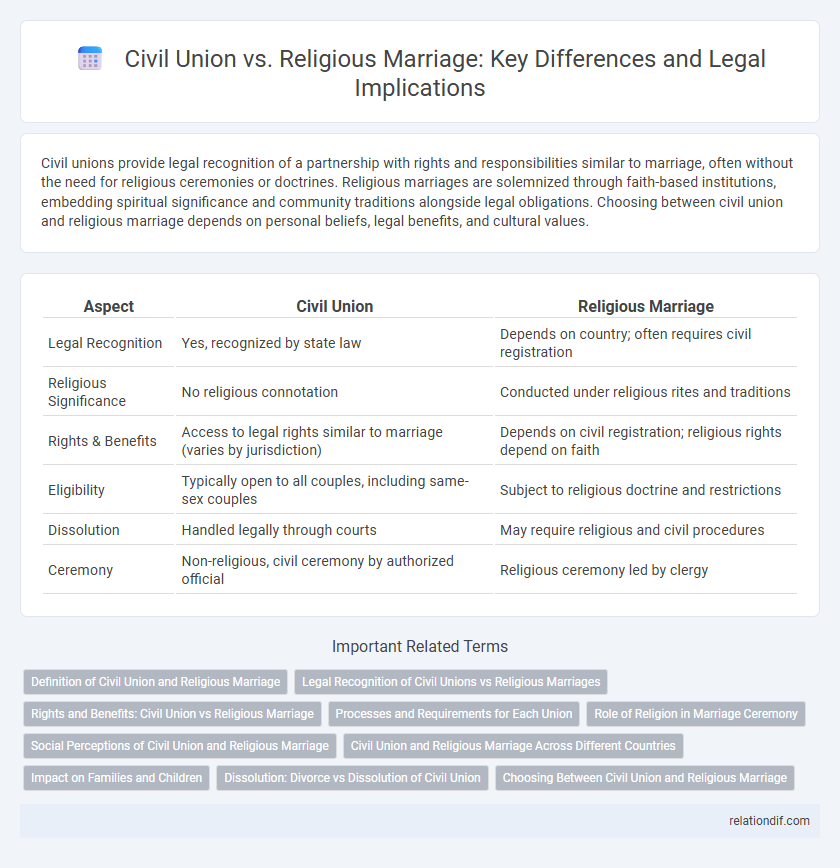Civil unions provide legal recognition of a partnership with rights and responsibilities similar to marriage, often without the need for religious ceremonies or doctrines. Religious marriages are solemnized through faith-based institutions, embedding spiritual significance and community traditions alongside legal obligations. Choosing between civil union and religious marriage depends on personal beliefs, legal benefits, and cultural values.
Table of Comparison
| Aspect | Civil Union | Religious Marriage |
|---|---|---|
| Legal Recognition | Yes, recognized by state law | Depends on country; often requires civil registration |
| Religious Significance | No religious connotation | Conducted under religious rites and traditions |
| Rights & Benefits | Access to legal rights similar to marriage (varies by jurisdiction) | Depends on civil registration; religious rights depend on faith |
| Eligibility | Typically open to all couples, including same-sex couples | Subject to religious doctrine and restrictions |
| Dissolution | Handled legally through courts | May require religious and civil procedures |
| Ceremony | Non-religious, civil ceremony by authorized official | Religious ceremony led by clergy |
Definition of Civil Union and Religious Marriage
Civil union refers to a legally recognized partnership between two individuals that grants similar rights and responsibilities as marriage without the religious or traditional aspect. Religious marriage is a union solemnized according to the rites and customs of a faith community, often carrying spiritual significance and adhering to specific doctrinal teachings. Civil unions are governed by civil law, while religious marriages operate under religious law or ecclesiastical authority.
Legal Recognition of Civil Unions vs Religious Marriages
Civil unions provide legal recognition similar to marriage, granting partners rights related to inheritance, taxation, and healthcare decisions, often recognized by state governments. Religious marriages, while culturally and spiritually significant, may not automatically confer legal status without government registration. Legal recognition of civil unions varies by jurisdiction, whereas religious marriages generally require formal civil registration to be acknowledged legally.
Rights and Benefits: Civil Union vs Religious Marriage
Civil unions grant couples legal rights such as property ownership, inheritance, and hospital visitation, similar to those in marriage but can vary by jurisdiction. Religious marriage often includes spiritual and cultural recognition but may lack standardized legal benefits unless registered civilly. Couples seeking comprehensive legal protection typically opt for civil unions or civil marriage registration alongside religious ceremonies.
Processes and Requirements for Each Union
Civil union processes typically involve registering with a government authority, submitting legal identification, and meeting age and residency requirements, with minimal or no religious prerequisites. Religious marriages often require participation in specific rituals, approval from religious leaders, completion of premarital counseling, and adherence to doctrinal guidelines alongside legal registration. Both unions demand documentation such as birth certificates and identification, but religious marriages may also require proof of baptism or other sacraments depending on the faith tradition.
Role of Religion in Marriage Ceremony
Religious marriage ceremonies often emphasize spiritual beliefs, rites, and traditions specific to a faith community, reinforcing the couple's shared religious identity. Civil unions, by contrast, focus on legal recognition and rights, lacking religious context or ritual. The role of religion in marriage ceremonies varies widely, shaping not only the symbolic elements but also the moral and cultural significance attributed to the union.
Social Perceptions of Civil Union and Religious Marriage
Social perceptions of civil unions often emphasize legal recognition and inclusivity, appealing to couples valuing equality without religious affiliation. Religious marriage is traditionally viewed as a sacred bond endorsed by faith communities, reinforcing cultural and spiritual values. Society sometimes regards religious marriages as more legitimate or stable, while civil unions are seen as progressive alternatives reflecting modern social diversity.
Civil Union and Religious Marriage Across Different Countries
Civil unions provide legally recognized partnerships that often grant similar rights to marriage without religious connotations, varying significantly across countries such as France, where civil unions offer extensive spousal rights, and the United States, where recognition depends on the state. Religious marriages, deeply rooted in cultural and spiritual traditions, are governed by distinct rites and laws, influencing their legal standing differently in countries like India, where personal laws based on religion regulate marriage, versus secular states where civil law predominates. The global landscape reveals diverse legal frameworks and societal attitudes shaping the status and recognition of civil unions versus religious marriages, affecting rights such as inheritance, taxation, and child custody.
Impact on Families and Children
Civil unions provide many legal protections similar to marriage, but often lack the societal recognition and religious validation that can influence family dynamics. Religious marriages frequently offer a communal support system and spiritual framework that strengthens family bonds and cultural identity for children. The choice between civil union and religious marriage significantly shapes the social environment and emotional well-being of families and offspring.
Dissolution: Divorce vs Dissolution of Civil Union
Divorce in religious marriage often involves complex rituals and adherence to faith-based doctrines, while dissolution of a civil union is governed strictly by civil law, emphasizing legal procedures and property division. Religious divorce may require approval from clergy or religious courts, whereas civil union dissolution is typically resolved through family courts focusing on equitable distribution and custody arrangements. Legal recognition and consequences of dissolution significantly differ, affecting benefits, inheritance, and parental rights depending on whether the union was religious or civil.
Choosing Between Civil Union and Religious Marriage
Choosing between a civil union and a religious marriage depends on personal beliefs, legal recognition, and cultural traditions. Civil unions offer legally recognized rights and protections without religious connotations, while religious marriages often hold spiritual significance and community validation. Couples should evaluate legal benefits, social expectations, and their own values to make an informed decision.
Civil Union vs Religious Marriage Infographic

 relationdif.com
relationdif.com